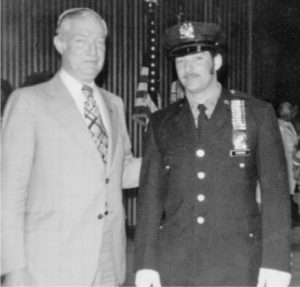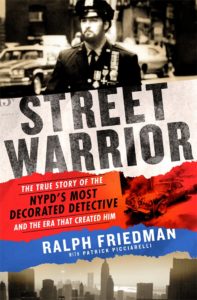by Ralph Friedman, with Patrick Picciarelli
I was constantly on the prowl to make quality arrests, the important word being quality. I doubt there’s a police officer in New York who couldn’t lock someone up thirty minutes into a shift. There’s always someone doing something wrong, but most infractions are trifling, and police officers are given discretion when deciding whether to make arrests for minor transgressions. These include simple assaults (particularly when the offender and complainant are friends), personal marijuana use, and misdemeanor criminal mischief when the offender is willing to make restitution. The NYPD allows discretion.
I was after felons. They don’t get the luxury of discretion, and, even if they did, they wouldn’t get it from me. This meant both on duty and off.

I remember one off-duty arrest vividly. It was a blisteringly hot August day and I was with a date at Orchard Beach, otherwise known as the Bronx Riviera. While the Bronx had quite a few beaches abutting Long Island Sound, Orchard Beach was the only one where you could enter the water and come out pretty confident you didn’t contract typhoid. It was crowded, noisy, and not the cleanest beach in America, but it belonged to us denizens of the Bronx and I went there often.
I was never off duty, as the term is defined. Constantly looking for bad guys, I didn’t care whether I was on a date, as I was that day, or in a gym, or on my motorcycle; I was always looking for something out of place. When I watch boxing on television, I’m looking more at the spectators than I am at the fighters. Same goes for everywhere else people congregate: movies, subways, funerals—you name it.
Station houses have wanted posters in a big-ring binder behind the desk. I didn’t know many cops who perused these posters. I did, although I was beginning to view this as an exercise in futility, because after months of sifting through them, the pictures and names were beginning to blur and I doubted I’d ever apprehend a wanted felon based on a wanted poster. There are literally thousands of wanted criminals in New York City; what are the odds that I’d ever remember a specific poster?
On that hot summer day at the beach, I was walking with my date on the boardwalk when I spotted a guy wanted for a burglary in Brooklyn. I’d seen a poster the previous week, and the picture displayed looked exactly like the man I’d almost bumped into, who was walking in the opposite direction.
I was going to go up against this guy without a weapon or handcuffs and no way to call for backup, so my normal policy of “don’t hurt me, I won’t hurt you” was on the back burner. If I were armed, my approach would have been to draw my weapon, identify myself, get him on the ground, and cuff him before he had a chance to run or retaliate.
I whirled and got up behind him. “Yo, bro,” I said, and tapped him on the shoulder. I didn’t recall his name from the poster. He turned with a pleasant expression on his face, which was quickly erased when I punched him in the jaw with everything I had. He hit the ground like a load of wet laundry.
People began screaming, running, falling over each other. The woman I was with stood wide-eyed. Someone yelled for the police. There was a summer police detail at Orchard Beach, and it didn’t take long before two cops came running over. I identified myself and explained what I had. They called for an ambulance for my still-comatose prisoner.
One cop, an old-timer, looked at me skeptically. “You recognized this guy from a wanted poster? You sure it’s him?”
Doubt engulfed me. What if this guy wasn’t who I thought he was? Had I seriously injured a look-alike? The bad guy’s twin brother?
There is a happy ending to this story: he was the guy on the wanted poster and the arrest earned yet another medal recommendation to be added to the several I already had pending. And in an unpredictable twist of fate, it turned out to be a happy ending for the perp, too.
About five years later, a man approached me as I was leaving the station house and asked me if I was Officer Friedman. I was immediately wary, as any cop would’ve been, particularly because I wasn’t in uniform and I had no idea who this guy was. How did he know me? I casually turned sideways to avoid that unpleasant kick to the testicles. My hand rested on my gun. “Yeah, that’s me. I know you?” This man could’ve been someone I’d arrested, now out of prison and looking for revenge.
I was half right. I had locked him up, and he was fresh out of the joint, but he didn’t have revenge on his mind.
He introduced himself and extended a hand for me to shake. I was still leery, but I shifted my weight and shook his hand. I had leverage if I needed to defend myself, though my gut told me I wasn’t going to have a problem.
“You don’t remember me, do you?” he said.
I had no idea who he was and told him so. Now he broke into a wide grin.
“I’m the guy you knocked out at Orchard Beach. I was wanted on the burglary beef in Brooklyn, remember? I just wanted to thank you. I needed to get that shit behind me, but most of all I needed a real lot of dental work, and I got it for free in prison.” He smiled again, flashing a nice set of choppers.
We bullshitted awhile; he said he went straight, had a great job in construction. We parted with another handshake.
And people ask me why I love police work.
RALPH FRIEDMAN served the NYPD from 1970 to 1984, at which time he retired due to being injured in the line of duty. In his short career he amassed more awards and honors than any other detective in the NYPD’s history. Street Warrior: The True Story of the NYPD’s Most Decorated Detective and the Era That Created Him chronicles his career.
PATRICK PICCIARELLI, a former U.S. Army machine gunner, spent twenty years in the NYPD, retiring as a lieutenant, and is a licensed private investigator. The author of Jimmy the Wags and Undercover Cop, he regularly contributes to Hardboiled magazine, among other publications.

